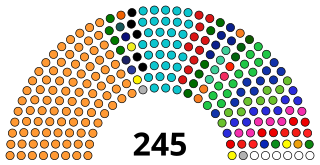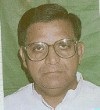Related Research Articles

The Rajya Sabha, constitutionally the Council of States, is the upper house of the bicameral Parliament of India. As of 2022, it has a maximum membership of 245, of which 233 are elected by the legislatures of the states and union territories using single transferable votes through open ballots, while the president can appoint 12 members for their contributions to art, literature, science, and social services. The potential seating capacity of the Rajya Sabha is 245, according to article 80 of the Indian Constitution. Members sit for staggered terms lasting six years, with about a third of the 238 designates up for election every two years, in even-numbered years. Unlike the Lok Sabha, the Rajya Sabha is a continuing chamber and hence not subject to dissolution. However, the Rajya Sabha, like the Lok Sabha, can be prorogued by the president.

The Lok Sabha, constitutionally the House of the People, is the lower house of India's bicameral Parliament, with the upper house being the Rajya Sabha. Members of the Lok Sabha are elected by an adult universal suffrage and a first-past-the-post system to represent their respective constituencies, and they hold their seats for five years or until the body is dissolved by the President on the advice of the council of ministers. The house meets in the Lok Sabha Chambers of the Sansad Bhavan, New Delhi.

The Parliament of India is the supreme legislative body of the Republic of India. It is a bicameral legislature composed of the president of India and two houses: the Rajya Sabha and the Lok Sabha. The president in their role as head of the legislature has full powers to summon and prorogue either house of Parliament or to dissolve the Lok Sabha. The president can exercise these powers only upon the advice of the prime minister and their Union Council of Ministers.

The 14th Lok Sabha was convened after the 2004 Indian general election held in four phases during 20 April – 10 May 2004, which led to the formation of first Manmohan Singh ministry (2004–2009). Indian National Congress-led United Progressive Alliance won 62 more seats than previous 13th Lok Sabha. The Lok Sabha is the lower house in the Parliament of India. 8 sitting members from Rajya Sabha, the Upper House of Indian Parliament, were elected to 14th Lok Sabha after the 2004 Indian general election.

Thalikkottai Rajuthevar Baalu, better known as T. R. Baalu, is an Indian politician. Baalu did his B.Sc. from New College, Chennai in Madras University and diploma in drafting engineering drawings from Central polytechnic Chennai. He is currently the MP of Lok Sabha of the Sriperumbudur constituency, elected five times since 1996 from Chennai South and Sriperumbudur. He is a leader of the DMK party and is known for political loyalty having been in the party since 1957. He is now the Treasurer of DMK, elected unopposed on 3 September 2020. He earlier served as the Principal Secretary of the DMK Party from August 2018 to January 2020.
This is a brief description of the lawmaking procedure in India.

Hansraj Ahir is an Indian politician and current Chairman of the National Commission for Backward classes. He is a former Union Minister of State for Home Affairs and Minister of State for Chemicals and Fertilizers in the First Modi Ministry. He was the former member of the 16th Lok Sabha in India. He was member of 11th Lok Sabha, 14th Lok Sabha, 15th Lok Sabha. He is famous for exposing Coal Mining Scam specially pouni-3 in WCL.

Surendrajeet Singh Ahluwalia is an Indian politician of the Bharatiya Janata Party (BJP), and a senior Member of Parliament in his 32nd year as a Parliamentarian.

Sharad Yadav was an Indian politician from the Rashtriya Janata Dal (RJD) party. He was elected to the Lok Sabha seven times and to the Rajya Sabha four times from JD(U). He was the first national president of Janata Dal (United), serving from its formation in 2003 until 2016. He was disqualified from the Rajya Sabha in 2017 and removed from party leadership positions for engaging in anti-party activities.

Members of the 15th Lok Sabha were elected during the 2009 general election in India. It was dissolved on 18 May 2014 by President Pranab Mukherjee.

Prakash Keshav Javadekar is an Indian politician. He is a member of the Bharatiya Janata Party (BJP) and served as the Minister of Environment, Forest and Climate Change from 30 May 2019 till 7 July 2021.

The cash-for-votes scandal was an Indian political scandal allegedly masterminded by then Opposition Party Bharatiya Janata Party politician Sudheendra Kulkarni in which the United Progressive Alliance, the majority-holding parliamentary-party alliance of India led by Sonia Gandhi, allegedly bribed Bhartiya Janta Party MPs in order to survive a confidence vote on 22 July 2008. The vote in the Lok Sabha arose after the Communist Party of India (Marxist)-led Left Front withdrew support from the government, who wanted to pursue an Indo-US nuclear deal.

P. C. Chacko is a former Member of Parliament from Thrissur Lok Sabha seat in Kerala. He is a former member of the Indian National Congress. Chacko resigned from Indian National Congress on 10 March 2021, stating that it had become difficult to be a congress leader in Kerala. P.C. Chacko is the first president of Thiruvananthapuram District committee of Kerala Students Union. He was the State president of Indian youth Congress from 1970 to 1973 and held the post of national General secretary of Indian youth Congress during 1973 - 1975. He became the general secretary of KPCC in 1975 and continued till 1979. He was elected to the Kerala Assembly in 1980 from Piravom constituency and during 1980- 81 he served as Minister for Industries in the state cabinet. He was elected to Loksabha in 1991 from Thrissur, in 1996 from Mukundapuram, in 1998 from Idukki and in 2009 again from Thrissur. On 2021 March 16 he joined Nationalist Congress Party, which is an ally of LDF in Kerala. He was appointed President of the Kerala State Unit of Nationalist Congress Party by the National President Sri. Sharad Pawar on 19 May 2021.
Rajeev Shankarrao Satav was an Indian politician from the Indian National Congress. At the time of his death, he was the member of the Rajya Sabha the upper house of Indian Parliament from Maharashtra.

Sriballav Panigrahi was an Indian politician, a leader of the Indian National Congress party in Odisha and was a member of the All India Congress Committee (AICC). He was elected to the Parliament of India from the Deogarh Lok Sabha constituency, three times, 1984, 1991 and 1996.

Elections in the state of Bihar, India are conducted in accordance with the Constitution of India. The Assembly of Bihar creates laws regarding the conduct of local body elections unilaterally while any changes by the state legislature to the conduct of state level elections need to be approved by the Parliament of India.
The Public Accounts Committee (PAC) is a committee of selected members of parliament, constituted by the Parliament of India, for the purpose of auditing the revenue and the expenditure of the Government of India. They check that parliament exercises over the executive stems from the basic principle that parliament embodies the will of the people. This committee along with the Estimates committee (EC) and Committee on Public Undertakings (COPU) are the three financial standing committees of the Parliament of India.

The Lokpal and Lokayuktas Act, 2013, commonly known as The Lokpal Act, is an anti-corruption Act of Indian Parliament in India which "seeks to provide for the establishment of the institution of Lokpal to inquire into allegations of corruption against certain important public functionaries including the Prime Minister, cabinet ministers, members of parliament, Group A officials of the Central Government and for matters connecting them".
The Committee on Public Undertakings (COPU) is a committee of selected members of parliament, constituted by the Parliament of India, for the purpose of examining the reports and accounts of the public sector undertakings (PSUs) as specified in the fourth schedule of the Rules of Procedure and Conduct of Business in Lok Sabha. This committee along with the Public Accounts committee (PAC) and the Estimates committee (EC) are the three financial standing committees of the Parliament of India.
The Parliamentary Standing Committee on Finance (SCOF) is a department related standing committee (DRSC) constituted by the Parliament of India comprising selected members of parliament for the purpose of legislative oversight on the policies and decision making of the following four ministries:
- Ministry of Finance (MoF)
- Ministry of Corporate Affairs
- Ministry of Statistics and Programme Implementation
- NITI Aayog
References
- ↑ http://www.parliamentofindia.nic.in/ls/intro/p21.htm [ bare URL ]
- ↑ "Parliamentary Committees".
- ↑ "Know and understand what is Joint Parliamentary Committee (JPC)?".
- ↑ "Joint Parliamentary Committee (JPC): What is that? We explain - 1 - National News – News – MSN India". Archived from the original on 2010-12-26. Retrieved 2011-06-10.
- ↑ "Joint Parliamentary Committee (JPC): What is that? We explain - 2 - National News – News – MSN India". Archived from the original on 2010-12-27. Retrieved 2011-06-10.
- ↑ "Joint Parliamentary Committees and what they achieved". Business Standard. November 17, 2010. Retrieved 24 April 2013.
- ↑ "2G scam: Govt sets up 30-member JPC".
- ↑ "2G Scam: PC Chacko willing to consider amendments to JPC draft report - India - DNA". www.dnaindia.com. Archived from the original on 2013-04-30.
- ↑ "Open to amending Joint Parliamentary Committee draft report on 2G scam if convinced, says Chacko".
- ↑ "PRS | Parliament Track | Parliamentary Committees | Joint Parliamentary Committee". www.prsindia.org. Archived from the original on 2015-06-11.
- ↑ "Joint Committee on the Personal Data Protection Bill, 2019 seeks views and suggestions".
